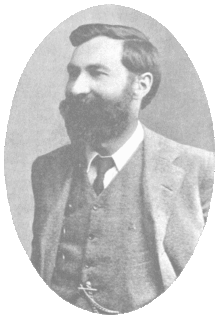Francis Sheehy Skeffington
Biography
 Francis Sheehy-Skeffington |
Francis Skeffington was born 23 December 1878 in Bailieborough, Co Cavan and is the only child of Joseph Bartholomew Skeffington and Rose Magorian. He was brought up in Downpatrick, Co Down, was educated privately by his father who was a schools inspector and enrolled in University College Dublin in 1896. He graduated with a BA in 1900 and an MA in 1902. His closest companions at college were James Joyce and Thomas Kettle. He was unconventional by nature, refused to shave and wore knickerbockers, long socks, and as a vociferous proponent of rights for women and wore a badge that read ‘Votes for Women’. He took a leading role in the college Literary and Historical Society, becoming auditor from 1897-98. At college he made the acquaintance of Hanna Sheehy, daughter of David Sheehy the Limerick born parliamentarian and agrarian radical. They married on 27 June 1903 and soon after marriage Hanna adopted her husband’s atheism and they reinforced each others feminist beliefs. When he graduated he worked as a free-lance journalist and his wife who was a school teacher was the main bread winner. He obtained a teaching position at St Kieran’s College, Kilkenny and became the first lay registrar of UCD. However he resigned in 1904 after publicly criticising the college’s reluctance to admit women on equal terms with men. The Sheehy-Skeffingtons joined the Irish Womens’ Suffrage and Local Government Association and the Young Ireland Branch of the United Irish League (The constituency element of the Irish Parliamentary Party) .They also supported the Women’s Social and Political Union which lobbied for women’s rights in Britain.
The Sheehy-Skeffingtons were co founders in 1908 of the Irish Women’s Franchise League and regularly addressed meetings in the Phoenix Park. During the 1913 Dublin Lock out, Francis became involved in a peace committee intending to reconcile both sides. He became a vice chairman of the Irish Citizens Army when it was established in 1913 on the understanding that it would have a defensive role and resigned when it became a military entity. He ran into conflict with the Ancient Order of Hibernians during the lock-out because of his total support of the strikers and tried to send strikers children to Liverpool to foster families during this period. The clergy opposed this move because of the fear of proselytisation and he was stripped and beaten by Hibernians while smuggling children on to a train at Kingsbridge (Hueston station). As a pacifist he opposed the First World War. He also felt that an allied victory would allow Britain become aggressively imperialist and repress Ireland. He was imprisoned on 29 May 1915 for making anti recruitment speeches and went on a hunger and thirst strike until he was released on 16 June.
Even though Sheehy-Skeffington was a pacifist he was not totally adverse to the use of force as he attempted to organise a civilian defence force to prevent looting during the 1916 rising. On the evening of Tuesday 25 April 1916 he was in the city centre trying to prevent looting when he was arrested by members of the East Surrey Regiment for no stated reason and after admitting to having sympathy for the insurgents’ cause he was held as an enemy sympathizer. Later that evening an officer of the 3rd battalion Royal Irish Rifles, Captain J.C. Bowen –Colthurst sent Sheehy –Skeffington out with an army raiding party in Rathmines, held as a hostage with his hands tied behind his back. The raiding party had orders to shoot Sheehy- Skeffington if it was attacked.
Bowen- Colthurst was seeking out ‘Fenians’ and arrested two journalists, Thomas Dickson and Patrick MacIntyre, Richard O’Connell who was a Sinn Fein politician was also arrested. Sheehy–Skeffington and the two journalists were shot the following morning. Bowen–Colthurst tried to cover up the murder of Sheehy–Skeffington by raiding his house seeking evidence to damage him. The event resulted in a Westminster–ordered cover-up. Bowen- Colthurst was deemed to be of unstable mind and was detained in an asylum for eighteen months. He later retired to Canada on full pension. Francis Sheehy–Skeffington was buried in the barracks yard at Portabello and was re-interred on 8 May 1916 in Glasnevin cemetery.
The couple had one son Owen Sheehy-Skeffington who was born 19 May 1909. Owen was a noted academic and senator and was a frequent letter writer to the Irish Times who commented on the social history of Ireland from 1940 to 1970.
Works
| Title | Year |
| Michael Davitt; Revolutionary, Agitator, and Labor Leader | 1908 |
| A forgotten small nationality : Ireland and the war | 1916 |
Irish correspondent for the Manchester Guardian, the Daily Herald and L’Humanite
Co founder with Hanna of The Irish Citizen newspaper.

